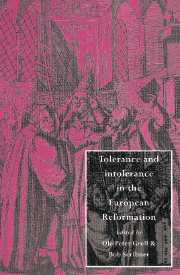Book contents
- Frontmatter
- Contents
- List of contributors
- Preface
- Dedication
- 1 Introduction
- 2 The travail of tolerance: containing chaos in early modern Europe
- 3 Preconditions of tolerance and intolerance in sixteenth-century Germany
- 4 Heresy executions in Reformation Europe, 1520–1565
- 5 Un roi, une loi, deux fois: parameters for the history of Catholic-Reformed co-existence in France, 1555–1685
- 6 Confession, conscience and honour: the limits of magisterial tolerance in sixteenth-century Strassburg
- 7 One Reformation or many? Protestant identities in the later Reformation in Germany
- 8 Toleration in the early Swiss Reformation: the art and politics of Niklaus Manuel of Berne
- 9 Tolerance and intolerance in sixteenth-century Basle
- 10 Exile and tolerance
- 11 The politics of toleration in the Free Netherlands, 1572–1620
- 12 Archbishop Cranmer: concord and tolerance in a changing Church
- 13 Toleration for Catholics in the Puritan revolution
- 14 The question of tolerance in Bohemia and Moravia in the age of the Reformation
- 15 Tolerance and intolerance in sixteenth-century Hungary
- 16 Protestant confessionalisation in the towns of Royal Prussia and the practice of religious toleration in Poland-Lithuania
- Index
3 - Preconditions of tolerance and intolerance in sixteenth-century Germany
Published online by Cambridge University Press: 07 December 2009
- Frontmatter
- Contents
- List of contributors
- Preface
- Dedication
- 1 Introduction
- 2 The travail of tolerance: containing chaos in early modern Europe
- 3 Preconditions of tolerance and intolerance in sixteenth-century Germany
- 4 Heresy executions in Reformation Europe, 1520–1565
- 5 Un roi, une loi, deux fois: parameters for the history of Catholic-Reformed co-existence in France, 1555–1685
- 6 Confession, conscience and honour: the limits of magisterial tolerance in sixteenth-century Strassburg
- 7 One Reformation or many? Protestant identities in the later Reformation in Germany
- 8 Toleration in the early Swiss Reformation: the art and politics of Niklaus Manuel of Berne
- 9 Tolerance and intolerance in sixteenth-century Basle
- 10 Exile and tolerance
- 11 The politics of toleration in the Free Netherlands, 1572–1620
- 12 Archbishop Cranmer: concord and tolerance in a changing Church
- 13 Toleration for Catholics in the Puritan revolution
- 14 The question of tolerance in Bohemia and Moravia in the age of the Reformation
- 15 Tolerance and intolerance in sixteenth-century Hungary
- 16 Protestant confessionalisation in the towns of Royal Prussia and the practice of religious toleration in Poland-Lithuania
- Index
Summary
Introduction
This chapter is intended to offer some broad reflections on the problem of tolerance and intolerance within the framework of German history which might serve as social-historical parameters for the major themes of this volume. It is my intention to raise issues for further exploration, rather than to provide answers, although many of the thoughts offered here first emerged in the course of my own research many years ago, while pondering the unique circumstances of the religious settlement achieved in the Thuringian city of Erfurt, which in 1530, by means of a treaty of state, allowed the exercise of divergent religious worship within the same polity, without implying any disobedience to the secular authority of the town's ruler. The example seemed to offer a paradigm of the conditions under which toleration was possible in the modern era: the separation of church and state and the acceptance of plurality of religions. It was immediately apparent, however, that the degree of toleration thus achieved was dependent not on any ideals about the philosophical or theological desirability of toleration, nor on any altruistic regard for the rights of minorities, but was a consequence of Erfurt's unusual constitution, political, social and economic situation, what we might call a ‘pragmatic conjuncture’, which overrode other, under different circumstances stronger, considerations tending towards intolerance and even fanaticism.
From the Erfurt example we can readily identify two approaches to tolerance and intolerance: the idea of tolerance and its theoretical foundations; and the broad conditions under which any given period or society might be said to be tolerant or intolerant.
- Type
- Chapter
- Information
- Tolerance and Intolerance in the European Reformation , pp. 32 - 47Publisher: Cambridge University PressPrint publication year: 1996
- 10
- Cited by



